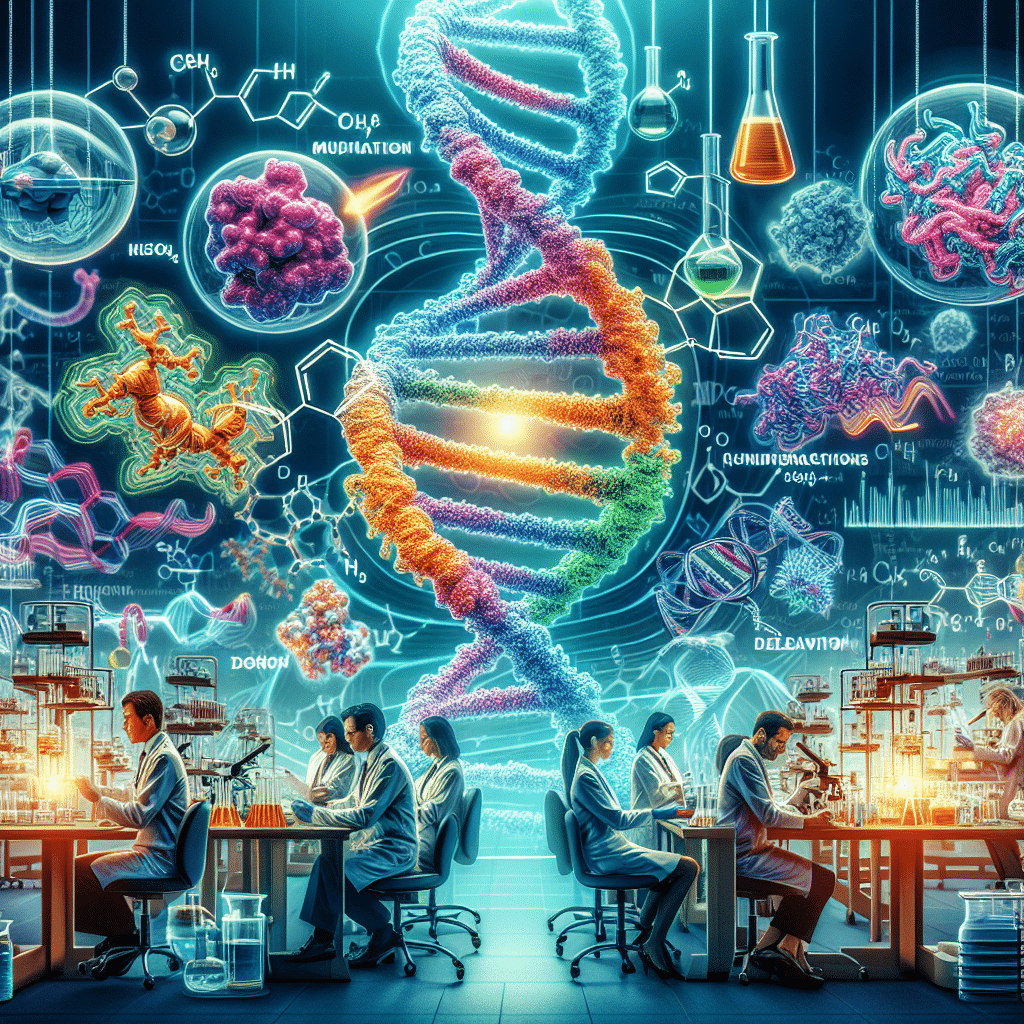Protein Engineering: Designing the Next Generation of Molecules
-
Table of Contents
- Protein Engineering: Pioneering the Molecules of Tomorrow
- The Fundamentals of Protein Engineering
- Applications of Protein Engineering
- Case Studies and Success Stories
- The Future of Protein Engineering
- Challenges and Considerations
- Conclusion: The Impact of Engineered Proteins
- Discover ETprotein’s High-Quality Protein Products
Protein Engineering: Pioneering the Molecules of Tomorrow

Protein engineering is a rapidly advancing field that sits at the intersection of biology, chemistry, and computational science. It involves the design and construction of new proteins or the modification of existing ones to create molecules with desirable properties. These engineered proteins have the potential to revolutionize industries ranging from pharmaceuticals to biofuels. In this article, we will delve into the intricacies of protein engineering, explore its applications, and consider the future of this transformative technology.
The Fundamentals of Protein Engineering
At its core, protein engineering seeks to understand the relationship between the structure of proteins and their function. By manipulating the sequence of amino acids that make up a protein, scientists can alter its shape and, consequently, its activity. There are two main approaches to protein engineering:
- Directed Evolution: This method mimics natural selection in the laboratory. Random mutations are introduced into a protein’s gene, and the resulting variants are screened for desired traits. The best-performing proteins are then used as templates for further rounds of mutation and selection.
- Rational Design: This approach involves the deliberate design of new proteins or the modification of existing ones based on detailed knowledge of their structures and functions. It often employs computational tools to predict how changes in amino acid sequence will affect protein behavior.
Both methods have their advantages and are often used in conjunction to create proteins with unprecedented capabilities.
Applications of Protein Engineering
Engineered proteins have a wide array of applications across various fields. Here are some notable examples:
- Medicine: Engineered antibodies are used in the treatment of cancer and autoimmune diseases. Proteins can also be designed to deliver drugs specifically to diseased cells, reducing side effects.
- Industrial Enzymes: Proteins that catalyze chemical reactions are used in the manufacture of everything from laundry detergents to biofuels. Engineering these enzymes can make them more efficient, stable, and environmentally friendly.
- Agriculture: Proteins that confer resistance to pests or extreme environmental conditions can be introduced into crops, leading to improved yields and sustainability.
- Biotechnology: Engineered proteins can be used to create biosensors that detect pathogens or environmental pollutants with high specificity and sensitivity.
These applications are just the tip of the iceberg, as protein engineering continues to unlock new possibilities.
Case Studies and Success Stories
One of the most successful examples of protein engineering is the development of Humira, an antibody used to treat rheumatoid arthritis and other inflammatory diseases. Through directed evolution, scientists were able to create an antibody with high affinity for a protein involved in inflammation, leading to a highly effective treatment.
In the field of industrial enzymes, Novozymes has engineered a variety of enzymes that are used in detergents to break down stains at lower temperatures, saving energy and reducing environmental impact.
These case studies demonstrate the practical benefits of protein engineering and its potential to address some of the world’s most pressing challenges.
The Future of Protein Engineering
The future of protein engineering is bright, with ongoing research pushing the boundaries of what is possible. Advances in computational biology are enabling the design of proteins with greater accuracy and speed. Additionally, the integration of artificial intelligence and machine learning is set to further accelerate the discovery and optimization of novel proteins.
As our understanding of protein structure and function deepens, we can expect to see engineered proteins with even more remarkable properties. These could include enzymes that convert waste into biofuels with unprecedented efficiency or proteins that can target and neutralize emerging pathogens.
Challenges and Considerations
Despite its promise, protein engineering faces several challenges. The complexity of protein folding and function means that designing proteins from scratch is still a difficult task. Moreover, ethical considerations must be taken into account, particularly when it comes to applications in humans and the environment.
Regulatory frameworks will need to evolve to keep pace with the advancements in protein engineering, ensuring that new products are safe and beneficial for society.
Conclusion: The Impact of Engineered Proteins
Protein engineering is a field that holds immense potential for innovation and problem-solving. By designing the next generation of molecules, scientists are creating solutions that could transform medicine, industry, agriculture, and beyond. As research continues to advance, we can expect to see engineered proteins play an increasingly central role in our lives, offering hope for a healthier, more sustainable future.
Discover ETprotein’s High-Quality Protein Products
If you are in search of premium protein products, ETprotein offers an extensive range of organic and plant-based proteins that cater to various industries. Their commitment to quality, non-GMO, and allergen-free products makes them a top choice for businesses looking to incorporate superior protein ingredients into their offerings.
About ETprotein:
ETprotein, a reputable protein Chinese factory manufacturer and supplier, is renowned for producing, stocking, exporting, and delivering the highest quality organic bulk vegan protein and plant proteins. They include Organic rice protein, clear rice protein, pea protein, clear pea protein, pumpkin seed protein, sunflower seed protein, mung bean protein, peanut protein etc. Their offerings, characterized by a neutral taste, non-GMO, allergen-free attributes, cater to a diverse range of industries. They serve nutraceutical, pharmaceutical, cosmeceutical, veterinary, as well as food and beverage finished product distributors, traders, and manufacturers across Europe, USA, Canada, Australia, Thailand, Japan, Korea, Brazil, and Chile, among others.
ETprotein specialization includes exporting and delivering tailor-made protein powder and finished nutritional supplements. Their extensive product range covers sectors like Food and Beverage, Sports Nutrition, Weight Management, Dietary Supplements, Health and Wellness Products, and Infant Formula, ensuring comprehensive solutions to meet all your protein needs.
As a trusted company by leading global food and beverage brands and Fortune 500 companies, ETprotein reinforces China’s reputation in the global arena. For more information or to sample their products, please contact them and email sales(at)ETprotein.com today.












